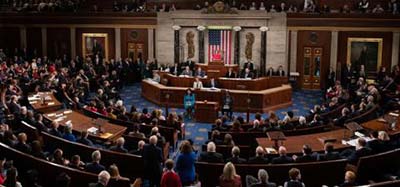
MBA, Trade Groups Urge Congress to Reject OECD Marginal Rates in Proposed Legislative Framework

As the House and Senate near what appears to be the end of a long and contentious inter- and intraparty debate over an economic stimulus package, the Mortgage Bankers Association joined nearly 100 other trade associations and policy groups to oppose a provision they say would unfairly tax family-owned businesses.
The letter to House and Senate leadership said the Biden Administration’s Build Back Better Framework released last week would impose the Organization for Economic Cooperation and Development’s highest marginal rates on family-owned businesses.
The bill would expand the 3.8 percent Net Investment Income Tax to all pass-through business income; impose a new surtax of up to 8 percent on all forms of income, including family businesses; and make permanent and expand the loss-limitation rules under Section 461. The White House estimates these three changes would amount to a $650 billion tax hike over 10 years.
Additionally, the tax rate hikes in the Framework would apply to businesses making significantly less than the advertised levels. The White House fact sheet suggests the new surtax would impose a 5 percent tax on a taxpayer’s modified adjusted gross income over $10 million, and 8 percent in excess of $25 million. For pass-through businesses held in trust, however, these thresholds are fifty times lower — $200,000 and $500,000, respectively.
“You don’t have to be a very big business to earn $200,000,” the letter said. “These businesses just survived a global pandemic and for Congress to impose massive tax hikes on them, with rates exceeding 50 percent in some cases, would be incredibly damaging.”
The letter noted individually- and family-owned businesses comprise nearly all businesses in the United States and employ the vast majority of private-sector workers. Yet, the letter said, the Framework would significantly increase rates on those businesses at income levels well below the advertised thresholds.
The same is true for the expansion of the 3.8 percent NIIT. The expanded NIIT’s threshold for joint filers with S corporation or partnership income is $500,000, but it is just $13,000 for a family business with ownership shares held in taxable trusts. Trusts are a common feature of succession planning for family businesses, the letter said. While they may have tax implications, in most cases families use trusts for non-tax purposes, as they ease the transition of the business from one generation to the next by clarifying ownership and management roles and avoiding probate court. As such, trusts are a common feature of estate planning for family businesses both large and small.
“Due to the prevalence of trusts, the higher tax rates included in the Framework would harm tens of thousands of modestly sized family businesses located across the country. The rate increases contemplated by the Framework are significant,” the letter said.
The Tax Foundation estimates the higher tax rates will push the marginal rates of family businesses making more than $500,000 to more than 50 percent. When coupled with state and local levies, these rates hikes will result in the family businesses facing the highest marginal rates in the OECD, exceeding 57 percent.”
“Congress should avoid policies that harm Main Street employers at any time, but particularly at this difficult moment in our nation’s history,” the letter said. “Having survived the pandemic, family businesses are now confronted with rising inflation, labor shortages, and supply-chain disruptions. The tax increases included in the Framework would make a bad situation worse and encourage continued consolidation of economic power and decision making. Large, multi-national corporations have thrived during the pandemic. The Framework would tilt the rules further in their favor and away from locally- and family-owned businesses.”
